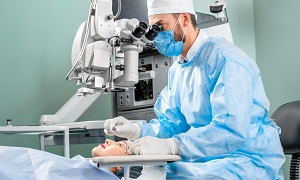Best Doctors in India for Phacoemulsification
- Opthalmologist, Chennai, India
- Over 26 years’ experience
- Apollo Hospitals Greams Road, Apollo Spectra Hospital Chennai-Alwarpet
Profile Highlights:
- Dr. Pratik Ranjan Sen is a specialist in Ophthalmology and serves as an Ophthalmologist – Consultant at Apollo Hospitals, Chennai.
- He has performed over 8000 Retinal detachment and other Vitreo retinal disorder surgeries.
- Dr. Pratik Ranjan Sen considers his profession a mission and is dedicated to his work. Due to this, he has gained enough trust and recommendations from his patients.
- Ophthalmologist, Chennai, India
- Over 21 years’ experience
- Apollo Hospitals Greams Road
Profile Highlights:
- Dr. Viswanathan P is one of the best eye surgeons in India having an overall experience of 21 years.
- He is a qualified doctor from the Tamil Nadu University of India and possesses a degree in MBBS and MS.
- One can visit him for routine eye check-ups or retina examinations and services like eye surgery, retina surgery, cataract surgery, etc.
- Ophthalmologist, Gurugram, India
- Over 13 years’ experience
- Medanta-The Medicity, Gurgaon
Profile Highlights:
- Dr. Svati Bansal is an esteemed consultant and practitioner of ophthalmology in Gurugram.
- Her specialty lies in orbit and oculoplasty, ocular oncology, ocular trauma, and neuro-ophthalmology.
- She has fellowships in neuro-ophthalmology and ocular motility, oculoplasty, and facial aesthetics, and ocular oculoplastic and ocular oncology.
- Top Ophthalmologist | Fortis Hospital, Mulund, Mumbai
- 10+ Years Experience
- Fortis Hospital Mulund Mumbai
Profile Highlights:
- Dr. Amit Jain is an experienced Ophthalmologist based in Mumbai, who specializes in treating patients with eye issues, particularly those related to Vitreo-Retina, Uvea, and ROP.
- He is an expert in employing the most recent techniques in eye surgery to address conditions like diabetes that damage the eyes and correct issues with the back of the eye.
- With more than 10 years of expertise, Dr. Amit Jain has made a name for himself as a leading expert in the field of eye care.
- He completed his medical training in Ophthalmology at the Dr. Rajendra Prasad Centre for Ophthalmic Sciences at AIIMS in New Delhi, a renowned institute for eye treatment. Later, he went on to pursue long term clinical fellowship in Vitreoretina at Sanskara Netralaya in Kolkata and Chennai.
- He started his professional career at Shri Ganapati Netralaya in Jalna, Maharashtra as an Associate Consultant in the department of Vitreoretina and Uvea services. And now, he serves as a Consultant in the Department of Ophthalmology at Fortis Hospital, Mulund.
- Apart from being a medical practitioner, Dr. Jain also enjoys imparting information and knowledge among young minds. He mentors aspiring medical professionals who wish to focus on eye care.
- Several of his works on the topic of eyes have been published in prestigious medical publications. Additionally, he often speaks at medical conferences where eye specialists from throughout the nation get together to exchange knowledge.
Best Hospitals in India for Phacoemulsification
Hospital Highlights:
- Apollo Hospitals is a private healthcare group in India, with its headquarters based in Chennai. Established in 1983 by Dr. Prathap C. Reddy, the group offers a wide range of medical treatments and services across various specialties.
- It is renowned for emphasizing innovation and utilizing cutting-edge medical technologies into patient treatment.
- Known as India’s first corporate hospital, Apollo Hospitals is often credited for pioneering the private healthcare revolution in the country.
- With clinics and hospitals located all throughout India, Apollo Hospitals is a nationwide healthcare organization. Its presence can also be found in foreign countries.
- Preventive health examinations, medical and surgical treatment, and diagnostic centres are just a few of the services that the Apollo group provides.
- The group has several centres of expertise, including Cardiac Sciences, Neurosciences, Orthopedics, Emergency Care, Cancer Care, and Organ Transplantation.
- City: Chennai, India
Hospital Highlights:
- RIMC is a multi-specialty hospital in a sprawling area of 36 acres located in Chromepet, Chennai, Tamil Nadu, India.
- The facility has 450 beds including 130 critical care beds, 9 operating rooms, modern reference laboratories and radiology services, and is conveniently located near road, rail and air transportation.
- RIMC is led and managed by world-renowned physicians committed to healthcare.
- RIMC offers the broadest range of clinical care, education, and research. The hospital offers state-of-the-art technology and modern treatment facilities designed to provide health care at an affordable cost.
- Rela Institute is driven by patient needs, comfort and confidence.
- City: New Delhi, India
Hospital Highlights:
- Fortis Hospital in Shalimar Bagh is a multi-super specialty hospital that strives to provide world-class patient care by leaving no stone unturned.
- Fortis, Shalimar Bagh, with 262 beds and a 7.34-acre footprint, provides the best level of medical care through its team of doctors, nurses, technicians, and management professionals.
- City: Bengaluru, India
Hospital Highlights:
- Established in 2007, the Apollo Hospitals Bangalore is a 300-bed multispecialty hospital situated in Bannerghatta Road, Bangalore.
- Equipped with the state-of-the-art technology, it is a leading hospital dedicated to providing healthcare needs to patients with compassion and expertise.
- It is the first hospital to have completed the highest number of Robot Assisted Heart Surgeries in India.
- Over the years, it has successfully conducted some of the rarest medical procedures such as spinal angiolipoma excision, autologous chondrocyte implantations, and tibial tuberosity shift with MPSL reconstruction.
- The Apollo Hospitals Bangalore has the reputation of performing the greatest series of airway stents in the country.
- Additionally, the hospital is known for providing comprehensive treatment in specialties such as gastroenterology, urology, gynecology, oncology, colorectal surgery, etc.
- The “The Minimal Access Surgery Centre” (MASC), one of Apollo Hospitals, Bangalore’s premier Centres of Excellence, is devoted to the use of minimally invasive surgical procedures.
- In 2013, THE WEEK-A C Nielsen, Best Hospital Survey ranked Apollo Hospitals Bangalore as the 2nd best multi-speciality hospital in Bangalore.
- City: Mumbai, India
Hospital Highlights:
- Gleneagles Global Hospital The 450-bed facility comprises of 17-stories, housing state-of-the-art infrastructure, and advanced medical care facilities.
- The hospital offers end-to-end clinical, surgical, and diagnostic services. It is equipped with a team of eminent medical professionals aided by qualified nurses and medical staff
- The Hospital offers advanced Endoscopic procedures, Hepatobiliary and Liver Surgeries, Surgical and Medical Gastroenterology, Bariatric Surgery, and Robotic surgery.
- The hospital is a center of excellence for Orthopedics, Joint Replacement, Knee Replacement, and Hip Replacement surgery.
- City: Hyderabad, India
Hospital Highlights:
- CARE Hospitals were established in the year 2000, by CARE Group.
- The multispecialty hospital has 435 beds, including 120 critical care beds, with an annual inflow of 180000 outpatients and 16,000 in-patients.
- The hospital provides specialty medical services in Cardiology, Cardiothoracic Surgery, Pediatric Cardiology, Pediatric Cardiothoracic Surgery, Neurology, Neurosurgery, Nephrology, and Urology.
- The hospital has the first dual source, 128 slice CT scanner (for high precision cardiac imaging) – the first of its kind in south India.
- The hospital offers a wide range of accommodation facilities for the convenience of its varied patient base, ranging from general wards to super deluxe rooms.
- City: Mumbai, India
Hospital Highlights:
- Fortis Hospital in Mulund is a 315-bed multi-speciality tertiary care hospital with five JCI accreditations that offers a wide variety of diagnostic and treatment services. The Fortis Hospital in Mulund delivers patient-centred treatment with cutting-edge technology, highly skilled and experienced surgeons, and paramedical staff.
- This institution houses Maharashtra’s largest multi-organ transplant centre. It is also the first heart transplant centre in western India to conduct 100 or more consecutive heart transplants in under four years. It is the only hospital in the city to have multi-organ transplants and has handled the youngest patient for angioplasty. Fortis Hospital Mulund now boasts the first advanced surgical robot in central Mumbai.
- Cardiology and heart surgery, urology, nephrology, neurosciences, orthopaedics, digestive care, emergency and critical care, and maternity care are among the services provided by the hospital.
- City: New Delhi, India
Hospital Highlights:
- Manipal Hospitals, Dwarka, is a super-specialty hospital in Dwarka, New Delhi, which is a part of Manipal Hospitals Group.
- The hospital aims to provide the best treatment on par with international standards at a fraction of the cost.
- Equipped with 380 beds, the hospital is also one of the new age hospitals which are equipped fully with state-of-the-art infrastructure, cutting-edge technology as well as the latest and advanced clinical practices. The hospital also has 13 modular Operation theatres with 118 beds which are solely meant for critical care.
- The hospital comprises internationally acclaimed doctors and highly professional and experienced hospital and medical staff who are able to provide preventive, therapeutic, and diagnostic services all under one roof.
- City: Chennai, India
Hospital Highlights:
- Located in Chennai, India, MGM Healthcare is a top multispecialty hospital that provides all medical services under one roof.
- Since its founding in 2019, MGM Healthcare has quickly become a leading national referral centre, creating several innovative flagship initiatives.
- MGM Healthcare combines next-generation medical and digital technologies to provide better patient results.
- With 12 centres of excellence, more than 400 inpatient beds, 100 intensive care unit beds, and 24/7 emergency care, MGM Healthcare leaves no chance in redefining the patient experience in Chennai.
- MGM Healthcare boasts 250+ expert doctors across 30+ departments, including Cardiology, Pulmonology, Neurology, Obstetrics & Gynaecology, and more.
- They house 12 specialized Centres of Excellence, including Neurosciences, Orthopaedics, and Multi-Organ Transplantation.
- Their team of doctors, nurses, and paramedics works together to give every patient individualized treatment.
Hospital Highlights:
- Lilavati Hospital & Research Centre is India’s premier multi-speciality tertiary care hospital and has been recognised as a global medical excellence centre.
- Lilavati Hospital & Research Centre has built an unrivalled level of trust with its patients over the years, thanks to a solid foundation that comprises cutting-edge facilities, the best medical competence, research, education, and charity endeavours.
- The hospital is quite proud of the fact that it now serves patients from all kinds of backgrounds, not just from the United States but from all around the world.
- The hospital has a total of 323 beds, one of the largest Intensive Care Units (ICUs), 12 Operation Theatres with modern amenities, over 300 consultants, and almost 1,800 personnel.
Phacoemulsification
Phacoemulsification is generally the most common form of cataract surgery performed. Cataract surgery is meant to restore vision for people whose vision becomes cloudy from cataracts, a clouding that forms on the lens of the eyes.
As you age, cataracts are more likely to form. In the first stages, people generally notice slight cloudiness as it affects only a small part of the lens. However, as it grows, it can block more light which makes the vision even cloudier.
Purpose
People, who want to get their cataracts problem treated, are considered candidates for this procedure. Cataracts can not only inflict you with blurry vision but can also lead to other problems, which include turning your eyesight sensitive to the glare from lights. This can turn your daily-life activities into a huge problem.
As cataracts develop and worsen, you should notice these common symptoms:
- gradual onset of blurry vision
- frequent changes in the prescription for corrective lenses
- poor central vision
- near vision improvement to the point where you no longer need reading glasses
- increased glare from lights
- poor vision in sunlight
People can choose the surgery due to other problems, as cataracts can be a hindrance in the treatment of other problems such as age-related macular degeneration, diabetic eye problems, or any other common eye diseases.
You can have cataracts for years before the vision is impaired enough to warrant surgery. Generally, eye doctors suggest eyeglasses to help improve the vision temporarily, but as the lens grows cloudier, vision will deteriorate.
Cataracts grow faster in younger people or people having diabetics. Therefore, doctors are likely to recommend surgery more quickly in such cases. If the patient suffers from other eye ailments, such as macular degeneration, then it is more likely that surgery is going to be recommended more quickly. Surgery becomes necessary when symptoms worsen to a point that everyday activities become a problem.
Preparation
First, a complete ocular exam is performed, so that the severity of the cataract can be determined and what type of surgery the patient will receive. For some denser cataracts, an older method named extracapsular extraction is preferred.
After the diagnostic exams are performed, if cataracts are detected in both the eyes, they will be treated separately.
Before the surgery, the overall health of the patient is also considered. A physical examination might be recommended by surgeons before surgery.
Patients are generally advised not to eat or drink anything after midnight on the day of the surgery. Patients also need to disclose all medications so that they are able to determine if they need to be discontinued. The surgeon might also recommend you to begin using antibiotic drops before your surgery, as this can limit the chance of infection.
The surgery is performed on an outpatient basis, and therefore it is important for patients to arrange for someone to take them home after the procedure.
Procedure
During the procedure, the doctor might use local anesthesia, which is injected around the eye, or topical anesthesia, numbing drops that are inserted into the eye.
First, the surgeon will make a tiny incision at the edge of your cornea. Then he/she creates an opening in the membrane that surrounds your lens. A small ultrasonic probe is next inserted, breaking up the cloudy lens into small fragments. Then the instruments vibrate at ultrasonic speed to chop and dissolve the lens material into tiny fragments. Then the fragments are suctioned out of the capsule by an attachment on the probe tip.
After the lens particles are removed, an intraocular lens implant, which is known commonly as IOL, is implanted and positioned into the lens’s natural capsule. It is inserted through the small corneal incision through a hollowed-out tube. Once the lens is pushed through, it unfolds and is positioned in place.
The procedure is generally performed on an outpatient basis and doesn’t require a hospital stay.
After the procedure
The incision which is made in the cornea generally doesn’t require any stitches and is self-sealing. Generally, post-operative eye drops are prescribed and they usually consist of antibiotics, steroids as well as a non-steroidal anti-inflammatory medication. These drops help in reducing inflammation and preventing infection. The antibiotic can be discontinued in around 7-10 days.
Most patients are able to experience an improvement in their vision almost immediately after the procedure. Though for others it steadily improves over 4-5 weeks. The majority of patients are able to restore their visual acuity after the procedure, and many of them also no longer require the use of glasses or contact lenses.
Risks
Though complications are unlikely, they might occur. Patients might experience spontaneous bleeding from the wound as well as recurrent inflammation after the surgery.
For some people, flashing, floaters and double vision might also occur a few weeks after the surgery. If you experience them, you should notify your surgeon immediately of any symptoms. Some are easily treatable, while some such as floaters might be a sign of a retinal detachment. The retina can become detached by the surgery if there is a weakness in the retina at the time of the surgery. However, this complication may not occur for weeks and months.
Another potential complication is infection. The most serious infection is endophthalmitis, an infection of the eyeball, although it is quite uncommon.
Glaucoma is also one of the possible complications, and in some rare cases, blindness. It is best that you discuss all risks and possible complications with your surgeon before you make the decision to undergo the procedure.
















